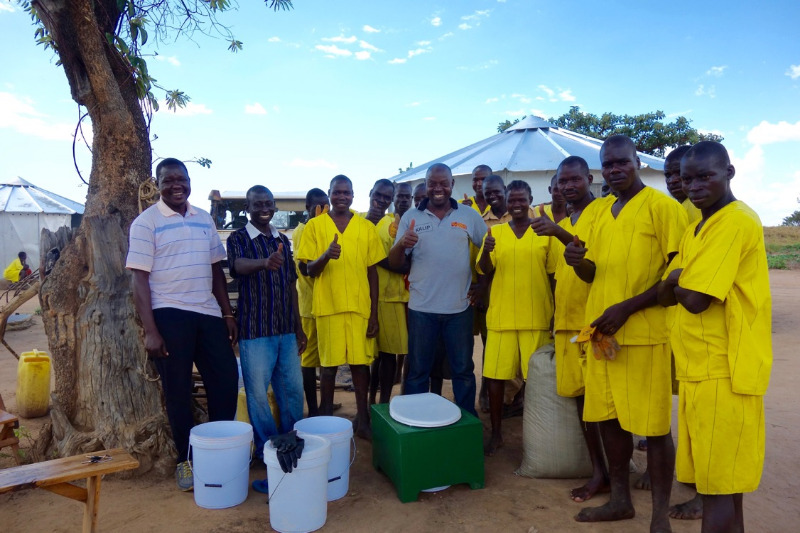- Health and hygiene, schools and other non-household settings
- Other non-household settings (e.g. hospitals, health centres, prisons, train stations, offices, work places)
- Water, Sanitation and Hygiene (WASH) in Correctional Facilities (Prisons) Is A Neglected Human Right.
Water, Sanitation and Hygiene (WASH) in Correctional Facilities (Prisons) Is A Neglected Human Right.
18.9k views
- Elisabeth
-
- User is blocked
- Freelance consultant since 2012
Less- Posts: 3372
- Karma: 54
- Likes received: 932
Re: Water, Sanitation and Hygiene (WASH) in Correctional Facilities (Prisons) Is A Neglected Human Right.
++++++++
Here is a link to a paper about a cholera outbreak at a psychiatric hospital that was published some time ago (the paper is available for free):
www.ncbi.nlm.nih.gov/pmc/articles/PMC4559692/
Nosocomial Cholera Outbreak in a Mental Hospital: Challenges and Lessons Learnt
from Butabika National Referral Mental Hospital, Uganda
Godfrey Bwire, Mugagga Malimbo, Atek Kagirita, Issa Makumbi, Eric Mintz, Martin A. Mengel,
and Christopher Garimoi Orach
Control of Diarrheal Diseases Section, Ministry of Health, Kampala, Uganda; Epidemiological Surveillance Division, Ministry of Health,
Kampala, Uganda; U.S. Centers for Disease Control and Prevention, Atlanta, Georgia; Central Public Health Laboratory, Kampala,
Uganda; Agence de Médicine Préventive, Paris, France; Makerere University School of Public Health, Kampala, Uganda
Abstract:
During the last four decades, Uganda has experienced repeated cholera outbreaks in communities; no cholera outbreaks have been reported in Ugandan health facilities. In October 2008, a unique cholera outbreak was confirmed in Butabika National Mental Referral Hospital (BNMRH), Uganda. This article describes actions taken to control the outbreak, challenges, and lessons learnt. We reviewed patient and hospital reports for clinical symptoms and signs, treatment and outcome, patient mental diagnosis, and challenges noted during management of patients and contacts. Out of 114 BNMRH patients on two affected wards, 18 cholera cases and five deaths were documented for an attack rate of 15.8% and a case fatality rate of 28%. Wards and surroundings were intensively disinfected and 96 contacts (psychiatric patients) in the affected wards received chemoprophylaxis with oral ciprofloxacin 500 mg twice daily until November 5, 2008. We documented a nosocomial cholera outbreak in BNMRH with a high case fatality of 28% compared with the national average of 2.4% for cholera outbreaks in communities. To avoid cholera outbreaks and potentially high mortality among patients in mental institutions, procedures for prompt diagnosis, treatment, disinfection, and prophylaxis are needed and preemptive use of oral cholera vaccines should be considered.
In any place where many people are housed together, the risk of spread of infectious diseases increases. And when people may have difficulty controlling their bowel function or adhering to sanitation and hygiene norms, the risk is further increased. In the mid-20th century, it was not uncommon to see outbreaks of shigellosis, hepatitis A, and other diseases transmitted through the fecal-oral route in psychiatric institutions in the US. Adequate WASH infrastructure is an absolute necessity, but when the population faces challenges practicing normative WASH behaviors there may also be a need for additional measures (more cleaning staff, closer supervision, etc.). For cholera, we feel that WASH conditions (and timely access to appropriate medical care) need to be addressed, but because these can take time, we also advocate for the use of cholera vaccine to protect prisoners, and other institutionalized populations, in an epidemic situation.
+++++
Regards,
Elisabeth
Freelance consultant on environmental and climate projects
Please Log in to join the conversation.
You need to login to reply- dannyogwo
-

- Champion gender advocacy, equality, non-discrimination and disabled social inclusion in WASH.....improve, promote & impacts lives..
Less- Posts: 39
- Likes received: 12
Re: Water, Sanitation and Hygiene (WASH) in Correctional Facilities (Prisons) Is A Neglected Human Right.
Working in remand homes, a 14 years adolescent girl made a request for a piece of paper. Requesting what she wants to use the piece of paper to do? She responded “I want to use it to manage my menstrual discharge”. She revealed that most girls in the remand home/ prison lack access to feminist hygiene materials to safely manage their menstruation. They are left with the option of sitting on the floor during the menstruation allowing their cloths to soak the menstrual discharge.
Please Log in to join the conversation.
You need to login to reply- Elisabeth
-
- User is blocked
- Freelance consultant since 2012
Less- Posts: 3372
- Karma: 54
- Likes received: 932
Re: Water, Sanitation and Hygiene (WASH) in Correctional Facilities (Prisons) Is A Neglected Human Right.
Meanwhile, I received the following information by a colleague via e-mail: He said that our thread in SuSanA about WASH in Prisons caught his attention. He has been reviewing information about cholera outbreaks in prisons (some papers are in preparation). He has provided links to five media reports of recent outbreaks:
- Cholera Outbreak in a Prison -- Kandal Province, Cambodia, December 2009 www.tephinet.org/cholera-outbreak-in-a-p...mbodia-december-2009
- One dead as cholera outbreak ravages Gombe prison www.premiumtimesng.com/health/health-new...es-gombe-prison.html
- Kenya’s cholera outbreak spreads from prisons, 31 killed www.panapress.com/Kenya-s-cholera-outbre...-18-lang1-index.html
- At a DRC Prison, Crowding and Poor Sanitation Lead to Outbreaks of Cholera, Tuberculosis globalpressjournal.com/africa/democratic...holera-tuberculosis/
- Yemen cholera outbreak reported in Sanaa prison www.middleeastmonitor.com/20170514-yemen...ted-in-sanaa-prison/
Interesting information!
Regards,
Elisabeth
Freelance consultant on environmental and climate projects
Please Log in to join the conversation.
You need to login to replyRe: Water, Sanitation and Hygiene (WASH) in Correctional Facilities (Prisons) Is A Neglected Human Right.
GiveLove is working with WelthungerHilfe on a pilot project to introduce compost sanitation at schools in the Karamoja region. The pilot (started in October 2016) included the prison at Nakapiripirit prison, nine schools, and approximately 75 households. The local sub-county government approved the project as a regional model to explore low-cost toilet and sanitation solutions.
Open defecation is widely practiced in the region because pit latrines are difficult to build due to loose, sandy soils and seasonal flooding. Also, population density in the rural areas is very low, so open defecation has persisted as a practice.
Several schools have opted to retro-fit pit latrines with compost toilet systems. We're currently working with school WASH clubs to determine best practices and feasibility of scaling up. Several other international NGOs have expressed interest in replicating our pilot. We're also conducting a feasibility study to work with small-scale service providers in Kampala on a co-composting project to convert dry fecal sludge and humanure compost into pelletized fertilizer.
I'll share more photos from the pilot and share our case study. We'll be finishing the internal evaluation in March 2019.
Please Log in to join the conversation.
You need to login to reply- Elisabeth
-
- User is blocked
- Freelance consultant since 2012
Less- Posts: 3372
- Karma: 54
- Likes received: 932
Re: Water, Sanitation and Hygiene (WASH) in Correctional Facilities (Prisons) Is A Neglected Human Right.
Yes, please share more photos and information about this case (prison in Northern Uganda (Nakapiritpirit)). Thanks.
Was this an isolated, single project and how did it come about? Are there any moves to upscale this and implement this, or something similar, in other prisons in Uganda as well? What is the role of government in this project?
Regards,
Elisabeth
Freelance consultant on environmental and climate projects
Please Log in to join the conversation.
You need to login to replyRe: Water, Sanitation and Hygiene (WASH) in Correctional Facilities (Prisons) Is A Neglected Human Right.
The inmates take care of all the composting and cleaning. We've visited three times since 2016, and everyone loves the compost toilet system. Local grasses are cut down for the onsite composting -- cover material is not a problem.
WelthungerHilfe built superstructures to house the compost toilets, which are outfitted with 20 liter containers.
Rice hulls and sawdust are used to control odors and flies. The compost toilet system is ideal for rural areas. This facility houses approximately 100 people, but the toilet system could easily scale up. There is plenty of space to compost.
If people are interested, I can share more photos and information.
Attachments:
-
 Ugandapris...let.jpeg
(Filesize: 152KB)
Ugandapris...let.jpeg
(Filesize: 152KB)
Please Log in to join the conversation.
You need to login to replyRe: Water, Sanitation and Hygiene (WASH) in Correctional Facilities (Prisons) Is A Neglected Human Right.
I believe we in Zambia have to learn from other countries like Uganda how she is implementing access to Water, Sanitation and Hygiene in they Correctional Facilities.
If its one way of punishment for prisoners. Remember human rights can be curtailed by law, then its means the Zambian Government through Ministry of Home Affairs under Correctional Facilities is abusing the rights of every individual in the facilities and we need to advocate for this to be stopped, every human being regards of status in society needs his/her human rights to be respected, we have to take up the challenge of advocating for improved and quality WASH services in Zambian Correctional Facilities in line with the basic human needs. Harsh conditions can't help them when are out of Correctional Facilities, that's why they keep bitter.
Please Log in to join the conversation.
You need to login to replyRe: Water, Sanitation and Hygiene (WASH) in Correctional Facilities (Prisons) Is A Neglected Human Right.
Traditionally ICRC (www.icrc.org/) has a WASH in prisons focus due to their work with prisoners of war and political prisoners.
Back when I was working in Uganda the local prison authority (www.prisons.go.ug/) was also quite active in trying to improve their WASH services.
Please Log in to join the conversation.
You need to login to replyWater, Sanitation and Hygiene (WASH) in Correctional Facilities (Prisons) Is A Neglected Human Right.
Attachments:
-
 images.jpg
(Filesize: 9KB)
images.jpg
(Filesize: 9KB)
-
 Prisoners2.jpg
(Filesize: 212KB)
Prisoners2.jpg
(Filesize: 212KB)
Please Log in to join the conversation.
You need to login to reply- Health and hygiene, schools and other non-household settings
- Other non-household settings (e.g. hospitals, health centres, prisons, train stations, offices, work places)
- Water, Sanitation and Hygiene (WASH) in Correctional Facilities (Prisons) Is A Neglected Human Right.








